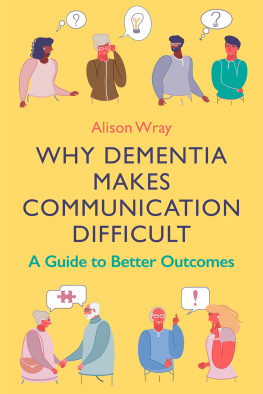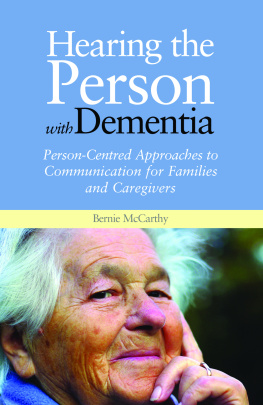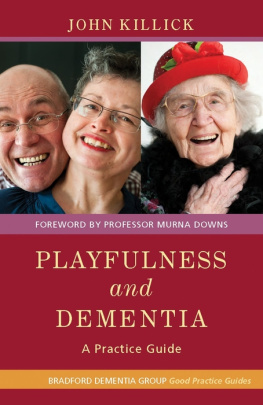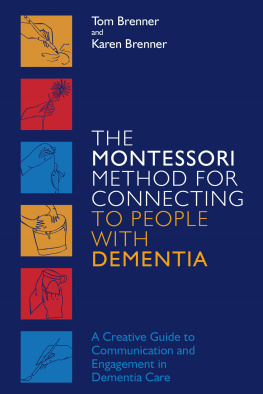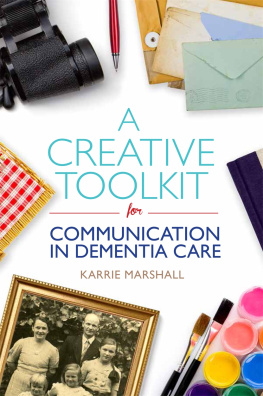Contents
Page list

of related interest
Doing Relationship-Centred Dementia Care
Learning from Each Other for Better Dementia Support
David I.J. Reid
ISBN 978 1 78592 306 7
eISBN 978 1 78450 613 1
Communication Skills for Effective Dementia Care
A Practical Guide to Communication and Interaction Training (CAIT)
Edited by Ian Andrew James and Laura Gibbons
ISBN 978 1 78592 623 5
eISBN 978 1 78592 624 2
A Creative Toolkit for Communication in Dementia Care
Karrie Marshall
ISBN 978 1 84905 694 6
eISBN 978 1 78450 206 5
Creativity and Communication in Persons with Dementia
A Practical Guide
John Killick and Claire Craig
ISBN 978 1 84905 113 2
eISBN 978 0 85700 301 0
Timely Psychosocial Interventions in Dementia Care
Evidence-Based Practice
Edited by Jill Manthorpe and Esme Moniz-Cook
Foreword by Helen Rochford-Brenna, Chairperson of the European Working Group of People with Dementia
ISBN 978 1 78775 302 0
eISBN 978 1 78775 303 7
Namaste Care for People Living with Advanced Dementia
A Practical Guide for Carers and Professionals
Nicola Kendall
Foreword by Joyce Simard
ISBN 978 1 78592 834 5
eISBN 978 1 78450 975 0
Why Dementia Makes
Communication
Difficult
A Guide to Better Outcomes
ALISON WRAY

First published in Great Britain in 2021 by Jessica Kingsley Publishers
An Hachette Company
Copyright Alison Wray 2021
Illustrations copyright David Hallangen 2021
The right of Alison Wray to be identified as the Author of the Work has been asserted by her in accordance with the Copyright, Designs and Patents Act 1988.
All rights reserved. No part of this publication may be reproduced, stored in a retrieval system, or transmitted, in any form or by any means without the prior written permission of the publisher, nor be otherwise circulated in any form of binding or cover other than that in which it is published and without a similar condition being imposed on the subsequent purchaser.
A CIP catalogue record for this title is available from the British Library and the Library of Congress
ISBN 978 1 78775 606 9
eISBN 978 1 78775 607 6
Jessica Kingsley Publishers policy is to use papers that are natural, renewable and recyclable products and made from wood grown in sustainable forests. The logging and manufacturing processes are expected to conform to the environmental regulations of the country of origin.
Jessica Kingsley Publishers
Carmelite House
50 Victoria Embankment
London EC4Y 0DZ
www.jkp.com
Contents
Acknowledgements
This book distils and (I hope) makes more accessible the main content of my lengthy academic text The Dynamics of Dementia Communication (Oxford University Press, 2020). The many people who contributed to the development of those ideas are acknowledged there, but those whose examples or ideas feature here deserve mention: Samantha Collins, David Green, Wendy Lewis, Danuta Lipinska, Rois McDonagh, Lydia Morris and Val Ormrod. The book has benefited from the generosity of five people who carefully read and fed back on the draft: Phil McEvoy, Maria Nicol, Val Ormrod, Alister Robertson and Pauline Strong. Between them, these individuals represent my main target reader groups dementia care professionals, carer trainers, allied health professionals, family members and people who are themselves living with a dementia. To all of you, thank you for your insightful observations and your support for this enterprise. Im grateful to illustrator David Hallangen for generously allowing me to use images from our animated films. Id also like to thank my husband, Mike Wallace, who heard many of the ideas first (and probably came up with a few of them). Finally, thank you to Adam Renvoize for his work on the cover design, and to Elen Griffiths, Emma Scriver and Claire Robinson at Jessica Kingsley Publishers for guiding me through the practicalities of writing this sort of book.
Wray (2017, 2018, 2020a)
Preface: What Is This Book
About and Is It for You?
Dementia brings many challenges. None, however, is greater than its effect on communication. Dementia can cause difficulties with finding words, following conversations and recalling whats been said and whats happened. It can also affect a persons ability to piece together the different bits of information needed for creating and understanding statements and questions. Because communication is so important for our daily activities and our relationships, any problems with it can quickly impact negatively on our quality of life. And because communication is something we do with others, if dementia creates challenges for one person in the conversation, everyones affected.
If youve experienced, or are simply interested in, how dementia changes communication, then this book has been written for you. Perhaps you have a dementia diagnosis yourself and are concerned about being able to communicate effectively in the future. Perhaps you have a family member living with a dementia and want to support them better, as well as learn to manage your own responses to the things they say and the challenges they face. Perhaps your job involves supporting people living with a dementia every day. Or perhaps you just encounter them occasionally through your work as, say, a hairdresser, shop assistant, religious leader, taxi driver, plumber or postal delivery worker. If so, you might be wondering how best to complete your tasks while helping them feel comfortable around you. Perhaps you have a neighbour or friend with a dementia diagnosis, and wish you knew what to say to them, and how to be more supportive without experiencing any awkwardness and embarrassment. Or you might simply be interested in how communication works and why dementia makes it go wrong.
No book can solve all the problems, because every person is different and every dementia is different. So, although there are plenty of suggestions and ideas in these pages, the main purpose of the book is to explain why communication is so badly damaged by dementia. The best person to fix your communication problems is you, at the time they happen. For that, you need to recognize whats going on, and know what the options are for how to respond. Theres no magic wand, unfortunately. But this book can help you develop insights and ideas to try out.
CHAPTER ONE
Introduction
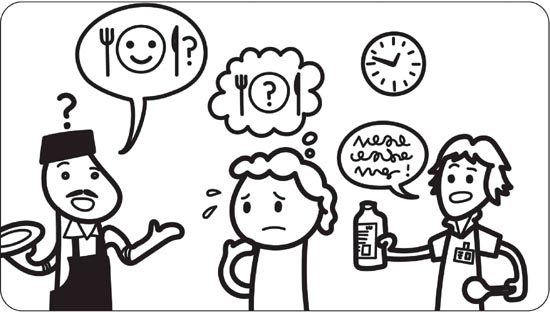
Kenny
I was waiting in the lobby of a residential care home while a staff member hunted for information about the facilities. It was a Sunday afternoon, and my husband was with me because this wasnt a work visit. We were on a reconnaissance mission my mother, at very short notice, had turned the corner from living independently to needing residential care, and we were wondering if this was the right place for her.
The building was old, with high ceilings, cornices and an air of grandeur. The lobby was in the former grand entrance hall, at one end of which a reception desk had been set up. The only staff member in the room was hidden behind the desk, bending down to search through a cupboard. Around me, several residents were sitting in high-backed armchairs, snoozing or watching the world go by. Sounds typical of residential care homes echoed around the lobby, despite the furnishings, carpet and full-length curtains shuffles of movement, squeaks of equipment, conversation, the occasional distressed shout or scream and, from the adjacent dining room, the clinking of cups as afternoon tea and cake were served.

